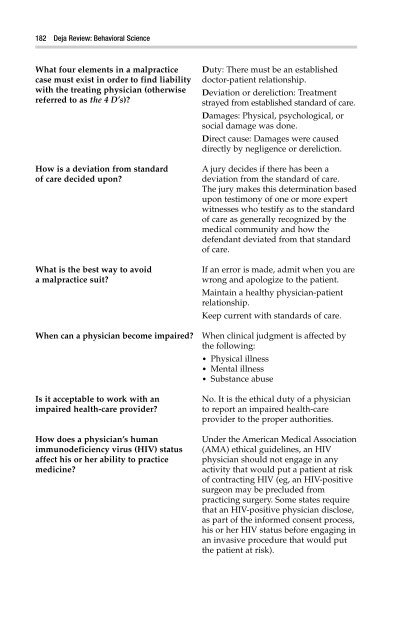Behavioral Science
You also want an ePaper? Increase the reach of your titles
YUMPU automatically turns print PDFs into web optimized ePapers that Google loves.
180 Deja Review: <strong>Behavioral</strong> <strong>Science</strong><br />
What is the cone method of<br />
interviewing, or “coning”?<br />
Starting with an open-ended question,<br />
then progressively narrowing down to<br />
more specific close-ended questions.<br />
CLINICAL VIGNETTES<br />
A 79-year-old woman came into the hospital complaining of shortness of breath.<br />
After an extensive workup, you find that she has metastatic lung cancer. Her son<br />
finds you in the hallway and states “In our culture our elders do not like to know<br />
about serious illnesses. It is my duty as a son to take care of my mother.” You are<br />
unclear about what cultural practices are appropriate to the patient. How do you<br />
approach this situation?<br />
It may very well be that there is a cultural aspect to discussions of terminal illness<br />
that is appropriate to consider in this case. If available in your institution, a “cultural<br />
consult” may be appropriate with someone more versed than you in these issues. If<br />
not, it would be inappropriate to withhold information based solely on what the son<br />
of the patient says. The best case would be to sit down with the patient and ask her<br />
about her cultural beliefs around illness—“Some members of your culture prefer<br />
not to talk about their illnesses, but instead allow their children to make medical<br />
decisions for them. How do you feel about the discussion of illness?”<br />
A patient with known sickle cell disease comes into the ER. He states he is in 10/10<br />
pain and requests 15 mg of morphine. The nurse says he is a “frequent flier” and<br />
worries that he is an addict. He doesn’t look like he’s is in any pain. What should<br />
you do?<br />
Treat his pain. With known disease it is more important that he does not suffer<br />
than to distinguish his symptoms from malingering. Remember, sickle cell crisis<br />
can be extremely painful even without outward signs of pain.<br />
You call a family meeting for a chronically ill patient whom you just found out has<br />
leukemia. Everyone is comfortably sitting in your office. What do you say next?<br />
“What do you know about your illness?” It is important to be open-ended and see<br />
what the patient’s thoughts are. Most likely he has been thinking about this much<br />
more than you and probably is very well informed; or he may have completely<br />
unrealistic views that would be good to learn about before the conversation. Probe<br />
a bit to understand this, and then to ascertain how much he wants to know before<br />
delivering the news.



